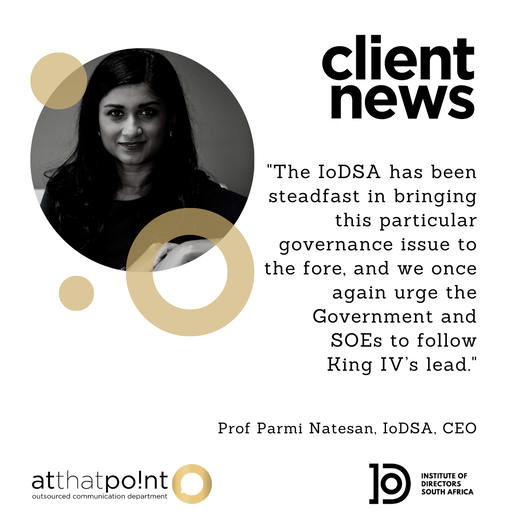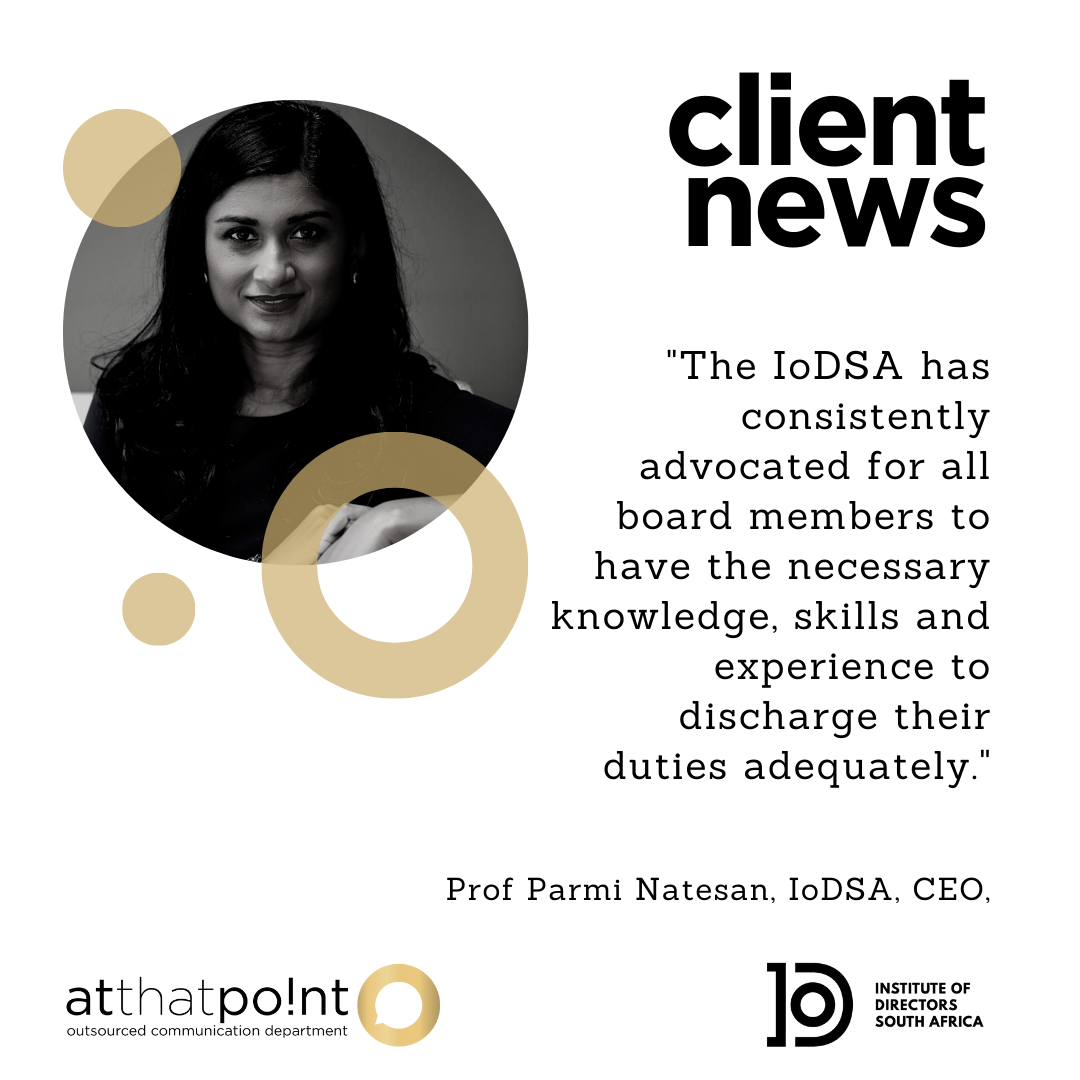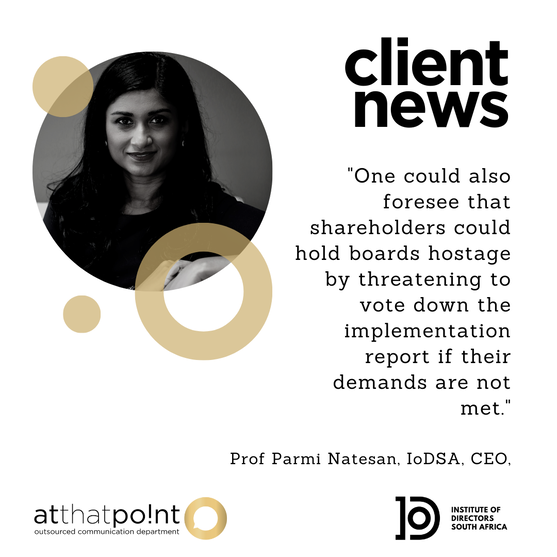|
News reports that the Minister of Public Enterprises has rejected the name put forward by the Eskom board to replace André de Ruyter as CEO once again raising the complex governance issues relating to the appointment of senior management at state-owned enterprises (SOEs). The reported reason for the Minister’s rejection of the board’s nominated candidate is that it was supposed to submit three names as stipulated by the Minister in terms of Eskom’s Memorandum of Incorporation.
Professor Parmi Natesan, CEO of the Institute of Directors in South Africa (IoDSA), says that the Minister’s rejection of the board’s nomination, whatever the technicalities, lays bare the governance tangle that continues to affect the governance balance at SOEs. “Governance best practice is for the board to appoint the CEO so that he or she is accountable to the board. The challenge is that SOEs have enabling legislation or founding documents which often stipulate that the government (effectively the shareholder) has the power to appoint senior management, as well as the board,” she says. “King IV recognises this, and suggests in the SOE supplement that the board be fully involved in the appointment of the CEO and that both parties agree that the CEO is accountable to the board, not the Minister, as representative of the shareholder.” If this approach is not followed, she adds, CEOs who do not have the confidence of the board may be appointed, and CEOs may see their reporting line leading directly to the Minister rather than the board. The resulting blurred reporting lines make it difficult for boards and management to work constructively together. The current state of affairs means that the faith of both the board and the Minister seems questionable. The former could be construed to be not following the Minister’s instructions, or rebellious in that it is asserting its preference for appointing the CEO it wants (in line with governance best practice). Similarly, the latter could be accused of having a hidden agenda, namely that the nomination did not meet with the approval of the political powers. Professor Natesan says. “The IoDSA has been steadfast in bringing this particular governance issue to the fore, and we once again urge Government and SOEs to follow King IV’s lead. In a perfect world, though, the appointment of the CEO should be the board’s prerogative. The board would then be able to hold the CEO properly to account, and could in turn itself be held to account by the shareholder.” ENDS MEDIA CONTACT: Stephné du Toit, [email protected], 084 587 9933, www.atthatpoint.co.za For more information on the IoDSA please visit: Website: www.iodsa.co.za Twitter: @The_IoDSA LinkedIn: Facebook: Institute of Directors South Africa
0 Comments
IoDSA and King Committee welcome proposed amendments relating to social and ethics committees12/9/2023 The Institute of Directors in South Africa (IoDSA) and the King Committee have broadly welcomed the amendments relating to social and ethics committees (SECs) in the Companies Amendment Bills.
Prof Parmi Natesan, CEO of the IoDSA, expressed support of the new clause (6A) proposed for section 72, which allows the minister to prescribe the minimum qualifications, skills and requirements for the SEC. “The IoDSA has consistently advocated for all board members to have the necessary knowledge, skills and experience to discharge their duties adequately,” she says. “Our Director Competency Framework will assist directors to acquire the skills they need on the board and the SEC.” The Chair of the King Committee, Ansie Ramalho, highlights three significant changes. One is the requirement for public companies and state-owned enterprises to appoint SEC members at their AGMs. The second proposed change requires the representation of non-executive directors on the SEC and the other involves the tabling of an SEC report at the AGM. Ramalho agrees with giving SECs more prominence. ”The requirements introduced by the Bill for the election and qualifications of members of SECs are likely to elevate its authority and effectiveness which is critical for a committee which exercises oversight of matters as important as the social and environmental impact of companies’ output and operations.” Ramalho suggests, however, that there be a rewrite of the regulations that address the responsibilities of the committee. “Currently the regulations do not deal with oversight of company ethics as an area for oversight by the SEC, despite - judging by the given name of the committee - it clearly being the intention. Also, other areas for monitoring and oversight as stated in the regulations are not sufficiently focused for meaningful reporting against which the SEC could be held accountable,” she says. Deon Rossouw, a member of the King Committee and Chair of the IoDSAs Social and Ethics Committee Forum, says that the intention to exempt certain companies, such as subsidiaries of a company that has an SEC, will contribute to the ease of doing business and eliminate duplicate administration. Rossouw also lauds the inclusion of a clause requiring an SEC report to be tabled at the AGM. “In line with modern thinking, it is important that shareholders are informed not only about the company’s financial performance but also about how it does business and its impact on society,” he says. However, he sounds a note of caution: while the new Bill requires the SEC report to be made “in the prescribed manner and form”, it does not provide guidance as to either. “We were very thankful that the drafters dropped the requirement for the SEC report to be passed by a resolution at the AGM as was previously tabled in the 2021 bill, which we argued was a bad idea since the report would contain historic information, thus a fait accompli which the vote cannot change,” he says. ENDS MEDIA CONTACT: Stephné du Toit, [email protected], 084 587 9933, www.atthatpoint.co.za For more information on the IoDSA please visit: Website: www.iodsa.co.za Twitter: @The_IoDSA LinkedIn: Institute of Directors South Africa Company Page Facebook: Institute of Directors South Africa The Institute of Directors in South Africa (IoDSA) and the King Committee say that, although they remain supportive of reform efforts in what is a highly contested area, some of the proposals contained in the Companies Act Amendment Bills 2023 relating to remuneration are problematic.
Both bodies agree that the proposal to have the remuneration policy tabled for approval at the AGM only every three years or when material amendments are made is constructive in that it gives shareholders a real voice. It is also in line with international leading practice. However, they are ringing alarm bells over proposals relating to firstly the voting on the remuneration implementation report and secondly, the consequences of the report not being approved at the AGM. The issue here is that in terms of the proposed Bill, the Remuneration Committee (RemCo) has to present its implementation report (giving effect to the remuneration policy) for approval at every AGM. If the ordinary resolution on the implementation report is not passed by at least 50% of the votes in favour of the report, RemCo members are obliged to step down from the committee, for a period of at least three years, although they would be able to remain on as board directors. Professor Parmi Natesan, CEO of the IoDSA, says that the consequences of this would be undesirable and impractical on many levels. “It would mean that those board members with specialist remuneration skills (already in short supply) would be no longer available to serve on RemCo—this at a time when boards are under pressure to reduce in size. The former RemCo members could suffer considerable reputational damage anyway,” she says. “One could also foresee that shareholders could hold boards hostage by threatening to vote down the implementation report if their demands are not met.” Ansie Ramalho, Chair of the King Committee, argues that a vote on the implementation report is neither constructive nor instructive. “The intention behind King IV in providing for a non-binding advisory vote on remuneration implementation was to furnish the opportunity for engagement between the board and shareholders as a constructive avenue for airing views and resolving differences. A binding vote makes sense for the remuneration policy because it is forward-looking, but it does not make sense when it comes to the implementation report, which is why no other jurisdiction in the world has implemented it. The implementation report is like the financial statements: it presents historical information and similarly should simply be presented to the AGM, but not voted on.” “We have no objection against consequences, but they are in the hands of shareholders who have the right to vote against the appointment of directors involved in remuneration decisions. We should also not lose sight of the fact that the numbers in the remuneration report are an outcome of the implementation of a policy supposedly previously approved by shareholders.” Dr Ronel Nienaber, Chair of the IoDSA Remuneration Committee Forum, adds that there are important details that need to be carefully considered if this amendment is passed. For example, if the RemCo’s implementation report is not passed, would the members have to step down immediately? This would potentially mean that the new members of the RemCo would find themselves having to engage with the shareholders to understand their concerns without any insight into the rationale for the previous RemCo’s decisions. Nienaber also asks whether there would be any other consequences beyond the RemCo members having to stand down, such as an additional action calling for a clawback of monies already paid. Dr Mark Bussin, member of the King Committee and the IoDSA Remuneration Committee Forum, raises the issue of South Africa’s attractiveness as a place to do business, already being compromised. “If we become the first country to introduce a binding vote on the RemCo’s implementation report, we risk being seen to be unfriendly to business and not consistent with well-established principles,” he says. ENDS MEDIA CONTACT: Stephné du Toit, [email protected], 084 587 9933, www.atthatpoint.co.za For more information on the IoDSA please visit: Website: www.iodsa.co.za Twitter: @The_IoDSA LinkedIn: Institute of Directors South Africa Company Page Facebook: Institute of Directors South Africa |
Archives
July 2024
Categories
All
|




 RSS Feed
RSS Feed